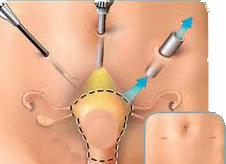Source: Danish Medical Journal -Acta Obstetricia et Gynecologica
 DANISH researchers, in connection with the Department of Anesthesia of the University of Copenhagen and the Insurance Association of Denmark, have studied reports of 136 ureteral injuries which constitute surgical malpractice in gynecological and obstetrical surgeries which resulted in litigation and insurance claims. Their findings? Failure to dissect and identify the ureter was the most common negligent act of the docotor. Patients were compensated for 54% of these claims for which 44 of the njuries were clearly caused by negligence.
DANISH researchers, in connection with the Department of Anesthesia of the University of Copenhagen and the Insurance Association of Denmark, have studied reports of 136 ureteral injuries which constitute surgical malpractice in gynecological and obstetrical surgeries which resulted in litigation and insurance claims. Their findings? Failure to dissect and identify the ureter was the most common negligent act of the docotor. Patients were compensated for 54% of these claims for which 44 of the njuries were clearly caused by negligence.
We will restate that point, according to these researchers, Iatrogenic (doctor-caused) ureteral injury or surgical malpractice during pelvic surgical procedures is a well-known complication and important cause of morbity (further harm). The authors investigated the circumstances surrounding registered ureteral injuries in order to identify potential opportunities to prevent such injuries. In a study which could never happen in the US, the researchers were permitted to closely evaluate some 136 medical insurance claims spanning a 10 year period (here 1996 to 2006). They found that Laparotomy procedures (where the belly is opened) were associated with 107 injuries (79%) and 29 injuries (21%) were caused during laparoscopic procedures. 34 patients continued to suffer from chronic renal dysfunction. Significantly, only 17 of the ureteral injuries were discovered during the procedure.
Conclusions: 44 of the ureteral injuries could potentially have been avoided using established surgical practices, most importantly, by exposing the ureter via dissection when indicated. Most of the ureteral injuries were discovered postoperatively. Under Danish Law, patients may file a claim if their medical treatment results in an injury or an unexpected side effect, and the independent Danish Patient Insurance Association (DPIA) will consider these claims. The DPIA operates on a no-blame basis and does not take any legal action beyond assessing damages. As a result, patients can file a claim with the DPIA free of charge with the purpose of seeking financial compensation. In general, financial compensation may be granted under any one of the following conditions: (i) an experienced specialist would have acted differently, whereby the injury could have been avoided, (ii) defects in or failure of the technical equipment were of major concern with respect to the incident, (iii) the injury could have been avoided by using alternative treatments, techniques or methods if these were considered to be equally safe and potentially offer the same bene fits and, finally, (iv) the injury is rare, serious and more extensive than the patient should be expected to endure. Compensation is calculated based on the extent of pain and suffering, reduced income, reduced ability to work and medical expenses. Here in the US, patients can only receive fair compensation for injuries caused by medical malpractice through litigation.
The Lewis Law Firm has a history of representing women who have sustained ureteral, bladder and kidney injuries from improperly performed obstetric and gynecologic surgery or surgical malpractice. If you or your loved one has suffered a ureteral or other injury following c-section or hysterectomy or fibroid surgery, contact the Lewis Law Firm for a Free consultation and case review, today.
Posted by: Gayle R. Lewis, Esquire
